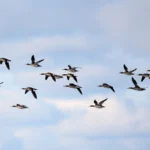Media Contact: Jordan Rutter, ABC Director of Public Relations, 202-888-7472 | jerutter@abcbirds.org | @JERutter
Expert Contact: Steve Holmer, ABC Vice President of Policy, 202-888-7490 | sholmer@abcbirds.org
Expert Contact: Kimberly Kaufman, Black Swamp Bird Observatory Executive Director, 419-898-4070 | kimkaufman@bsbo.org

Globally significant populations of Red-breasted Mergansers use Lake Erie, the site of the Icebreaker wind project. Photo by John Wijsman, Shutterstock
(Washington, D.C., May 22, 2020) The Ohio Power Siting Board (OPSB) approved the Icebreaker Wind Energy Project yesterday, with conditions, moving the country’s first freshwater wind development closer to construction. Stipulations have been made to protect birds in this critical area for migratory species, including turning off the turbines at night for eight months of the year, but conservationists are concerned that these measures are changeable and may not hold long-term.
“The developers and their supporters have been determined to build this project regardless of the overwhelming evidence that for migratory birds, this is among the worst places in North America to place wind turbines,” said Kimberly Kaufman, Executive Director of Black Swamp Bird Observatory (BSBO). “The proponents of Icebreaker have consistently demonstrated a callous disregard for science, and the project, whose financial basis is experimental at best, may mostly be remembered as a monument of death for birds.”
“The decision requires that the original Avian and Bat Memorandum of Understanding and Stipulations to the Application remain in effect, including turning the turbines off at night for eight months of the year,” said Steve Holmer, Vice President of Policy at American Bird Conservancy (ABC). “It’s positive that these have been upheld and must be complied with before construction can begin. However, we’re concerned that the stipulations can be reversed in the future.”
It is currently unclear whether the stipulations made by the OPSB will prove to be sufficient to cause the developer to withdraw the project. In addition, a lawsuit brought by BSBO and ABC against the Department of Justice and Army Corps of Engineers, for failing to adhere to the requirements of the National Environmental Policy Act when awarding a $40M grant to Icebreaker Wind, could still halt the project.
Icebreaker would be a precedent-setting wind energy facility in Lake Erie, offshore of Cleveland, Ohio. Turbines in the proposed project site would pose substantial collision risks to the enormous numbers of birds that use the area throughout the year, including large concentrations of migrating songbirds, as well as Common Loons, globally significant populations of Red-breasted Mergansers, and other waterfowl. Further, construction and increased vessel traffic associated with the project could pollute the waters used by these species.
“Icebreaker is a demonstration project,” said Kaufman. “Its review and approval will be considered the benchmark for hundreds, possibly thousands, of additional turbines expected to be proposed for the Great Lakes over the coming decades.”
Radar studies conducted by the U.S. Fish and Wildlife Service have recorded large numbers of migratory birds and bats near Great Lakes shorelines, including Lake Erie’s south shore. Many were flying at altitudes that would be within the rotor-swept area of wind turbines, making these birds susceptible to collision-related deaths, injuries, and disturbance.
“We need renewable energy development to combat the effects of climate change, but it needs to be done right and there are better alternatives such as distributed solar right in Cleveland,” said Holmer. “We must ensure that we’re not creating new problems in the process by building turbines in high-risk areas for birds.”
American Bird Conservancy and Black Swamp Bird Observatory are being represented in the lawsuit referred to above by the public interest environmental law firm Eubanks & Associates, LLC.
ABC thanks the Leon Levy Foundation for its support of ABC’s Bird-Smart Wind Energy Program.
###
American Bird Conservancy is a nonprofit organization dedicated to conserving birds and their habitats throughout the Americas. With an emphasis on achieving results and working in partnership, we take on the greatest problems facing birds today, innovating and building on rapid advancements in science to halt extinctions, protect habitats, eliminate threats, and build capacity for bird conservation. Find us on abcbirds.org, Facebook, Instagram, and Twitter (@ABCbirds).
Black Swamp Bird Observatory is a 501(c)(3) not-for-profit whose mission is to inspire the appreciation, enjoyment, and conservation of birds and their habitats through research, education, and outreach.